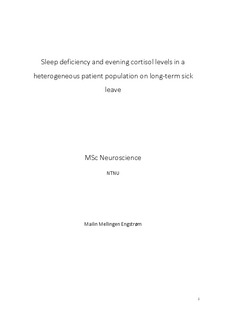Sleep deficiency and evening cortisol levels in a heterogeneous patient population on long-term sick leave
Master thesis
Permanent lenke
http://hdl.handle.net/11250/264327Utgivelsesdato
2013Metadata
Vis full innførselSamlinger
Sammendrag
Objectives: Sleep deficiency is implicated in long-term sick leave and is found to frequently co-occur and interact with both mental disorders and physical illness. Higher prevalence of sleep deficiency in clinical populations compared to the general population indicates a complex relationship between sleep and disease. A dysfunctional HPA-axis has been associated to conditions like depression, anxiety and chronic fatigue syndrome. This study used elevated evening cortisol levels as a predictor for sleep deficiency.
Methods: Saliva cortisol measures were assessed in a heterogeneous patient population on long-term sick leave (N = 44). The participants were diagnosed with depression, anxiety and/or chronic fatigue syndrome. Saliva cortisol was collected on two consecutive days at awakening, +30 min (CAR) and at 22:00. Multiple logistic regression were used to measure potential risk factors for sleep deficiency.
Results: Mental health (anxiety and depression) was a strong risk factor for sleep deficiency. The study did not find a significant relationship between elevated evening cortisol levels and sleep deficiency. CAR-to-evening cortisol slope was not significantly different in patients diagnosed with depression, anxiety or chronic fatigue.
Conclusion: This study replicates previous studies demonstrating that anxiety and depression, both comorbid and independently, are significant risk factors for sleep deficiency. No relationship was found between elevated evening cortisol levels and sleep deficiency.
